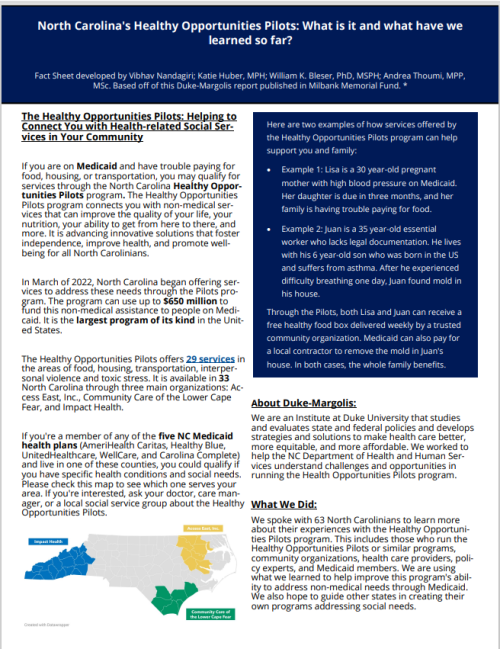Project Report
Addressing Social Needs through Medicaid: Lessons from Planning and Early Implementation of North Carolina’s Healthy Opportunities Pilots
Published date
Topics
Executive Summary
States, payers, and health systems across the United States are developing cross-sectoral solutions to address health-related social needs. However, most evidence on the effectiveness of these interventions to date is from time-limited interventions focused on specific subpopulations or services and often in urban areas only. In 2019, as part of North Carolina’s Section 1115 Medicaid Demonstration, the Centers for Medicare & Medicaid Services (CMS) authorized up to $650 million in Medicaid funding to implement the Healthy Opportunities Pilots (“Pilots”). The Pilots, launched in 2021, is a cross-sectoral program providing 29 evidence-based services to address social needs related to housing, food, transportation, interpersonal violence, and toxic stress through networks of community-based organizations (CBOs) to eligible Medicaid enrollees in three regions of the state. The Pilots will test the impact of these interventions at scale in Medicaid for the first time, including through major new payment and delivery designs. An ongoing evaluation sponsored by CMS will examine the effect of the Pilots on health outcomes, health care utilization, and health care costs.
To complement this evaluation, the authors conducted a multi-method qualitative study to generate timely and practical findings and recommendations from the planning, capacity-building, and early implementation of the program. Our findings can be useful not only to the Pilots’ policymakers, implementors, and providers, but also to stakeholders interested or involved in similar or smaller-scale initiatives in other states.
We identified six implementation and policy themes with recommendations for cross-sectoral programs to address social needs:
- Create a structure that accommodates and balances building local capacity with scaling service delivery
- Consider leveraging Medicaid demonstrations as part of a broader funding strategy to maximize flexibility and sustainability.
- Engage diverse community stakeholders during design and implementation to maximize existing community infrastructure
- Build a business case for scaling and sustaining CBO capacity to overcome historic funding challenges
- Develop sophisticated training and technical assistance approaches to build cross-sectoral knowledge across all program entities
- Ensure data and technology are flexible to support key cross-sectoral program functions and in compliance with multiple sectors’ laws and regulations
Duke-Margolis Authors

Katie Huber, MPH
Policy Research Associate

Rebecca Whitaker, PhD, MSPH
Research Director, North Carolina Health Care Transformation
Core Faculty Member
Senior Team Member

Robert Saunders, PhD
Senior Research Director, Health Care Transformation
Adjunct Associate Professor
Executive Team Member
Margolis Core Faculty
Additional Authors
Amanda Van Vleet, MPH, Associate Director, Innovation, NC Medicaid Strategy Office, North Carolina Department of Health & Human Services
Jessye Halvorson, MPP, Strategy & Analytics Consultant at Deloitte, Former Duke-Margolis Scholar
Michelle Lyn, MBA, MHA, Chief, Division of Community Health, Duke Department of Family Medicine and Community Health
Karina Vasudeva, Undergraduate at the UNC Gillings School of Global Public Health, Former Duke-Margolis Intern
Fact Sheet: North Carolina's Healthy Opportunities Pilots: What is it and what have we learned so far?
Vibhav Nandagiri; Katie Huber, MPH; William K. Bleser, PhD, MSPH; Andrea Thoumi, MPP, MSc.

